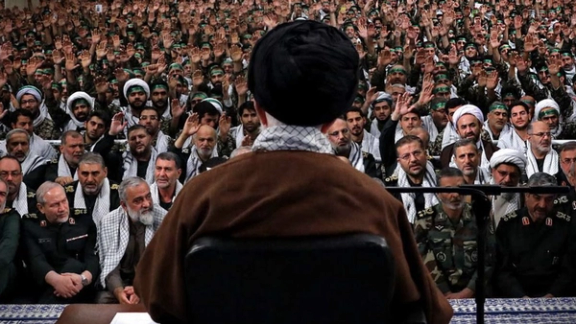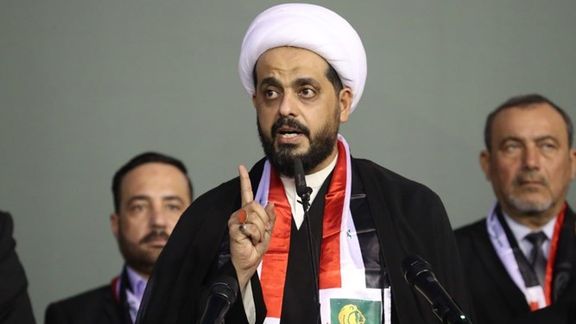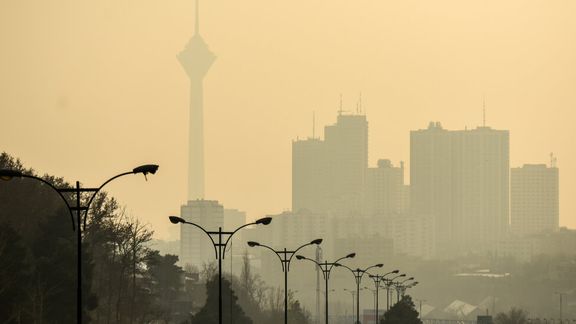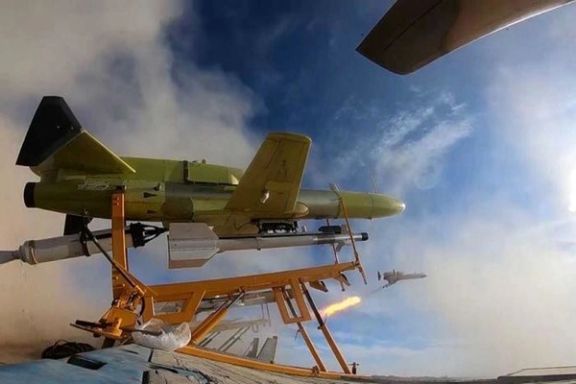Iran's Deputy Parliament Speaker Threatens To Close Strait Of Hormuz

Mojtaba Zonnour, the Deputy Speaker of the Iranian Parliament, has said that Iran can block the Strait of Hormuz if national security is jeopardized.

Mojtaba Zonnour, the Deputy Speaker of the Iranian Parliament, has said that Iran can block the Strait of Hormuz if national security is jeopardized.
Amid the Middle East conflict, Zonnour emphasized the Islamic Republic's right to stop and inspect ships in the international waters of the strait, citing national interests as a determining factor.
Known for his hardline stance, he claimed, "Generally, stopping and inspecting ships in the Strait of Hormuz is the right of the Islamic Republic. It is true that international laws govern global waters, and no country can act arbitrarily. However, the passage through global waters is free for everyone unless it threatens national interests." He did not elaborate on the international legal justification for such an act.
Zonnour, a hardliner, previously served as the Supreme Leader's Deputy Representative to the Islamic Revolutionary Guard Corps (IRGC) and chaired the Nuclear Subcommittee of the National Security and Foreign Policy Committee in the Islamic Consultative Assembly until 2019.
His comments come amid escalating tensions in the region, with earlier threats from Iranian officials suggesting the possibility of closing the Strait of Hormuz in response to the Hamas-Israel conflict.
Last month, Hassan Norouzi, another lawmaker said, “So far, resistance forces in Palestine, Syria and Iraq are sufficient, but if the situation becomes critical and we are asked [for assistance], it is possible that we would go to war against Israel to support the resistance.”
Despite supporting Hamas financially and militarily for two decades, Tehran has so far refrained from any direct military involvement in the Gaza war.

A prominent Iranian lawyer has argued that the dominating role of the hardliner Paydari Party is likely to hinder the legislative system and the Constitution.
In a recent commentary, Iranian lawyer Kambiz Nowrouzi referred to a statement made by hardline cleric Morteza Aqa-Tehrani, the chairman of the central council of Paydari Party. Aqa-Tehrani recently quoted the party's founding father, Ayatollah Mohammad Taqi Mesbah-Yazdi as having called for the nation's absolute obedience to Supreme Leader Ali Khamenei.
Aqa-Tehrani had quoted Mesbah as saying, "The absolute rule of the jurisconsult (Velayat-e Faqih) is not enough as the theory of government under the Islamic Republic. The system also needs absolute obedience of the people to the supreme leader."
The statement effectively renders the legislative system in Iran meaningless. According to the ultraconservative party, Khamenei can make any decision, and the people will have no choice other than obeying what he decrees.
Practically, during the past decade, Khamenei has been running the country in the same way, without elaborating on the underlying principle of the system. He effectively made the parliament obsolete by handing over key decisions on issues such as the annual budget to the heads of the legislative, executive and judiciary powers.

In 2019, when a fuel price rise led to a nationwide uprising, the parliament said that it was not consulted, and Khamenei had handed over decision-making on the matter to the heads of the three powers of the government. However, at least one of the trio, former President Hassan Rouhani said he was not involved in the price rise decision either and that he learned about it like everyone else, in the morning after the decision was implemented.
The idea of absolute obedience is based on another verdict by late Ayatollah Mesbah, a Muslim fundamentalist, which maintains that the Supreme Leader, currently Khamenei, is not elected by the people. He is appointed by God almighty!
Elsewhere, Mesbah said, "If there have been elections in Iran so far, that is because that is because the leader has so decided. However, the leader can announce another form of government that does not need people's input." He added that "The people's vote has no impact on the legitimacy of the government." He even said: "Who are the people to decide on the affairs of the state?" Nonetheless, his followers later tried in vain to interpret his words differently.
In his commentary, Nowrouzi pointed out that the Iranian Constitutional Law has stressed on the importance of the people's vote in several instances, including in Article 56 which stipulates that "The absolute ruler of the world and man is God, however, God has decided that man should be in charge of determining his own fate." The article adds that "No one can deprive man of this divine right or take advantage of that right in the interest of a certain group or individual."
Nowruzi further pointed out that "This article makes man unconditionally in charge of determining his own fate," adding that "This article is the foundation of national sovereignty.”
The lawyer also pointed out that Article 6 of the Iranian Constitution also says very clearly that "In the Islamic Republic the affairs of the state should be run based on public votes by electing the President, members of the parliament, members of city councils and so on, or based on referendum in other cases."
He further pointed out that this means the people are free to run the affairs of the state based on their free will and votes, and this is in sharp contrast to the idea of absolute obedience. The lawyer also claimed that both Khamenei and his predecessor Ruhollah Khomeini publicly opposed the idea of absolute obedience to the leader.
Nowruzi argued that the Islamic Republic is based on the two pillars of Islamism and Republicanism. If you do away with one of the two pillars, the system will collapse.

The Secretary-General of the Iran-backed Asaib Ahl al-Haq militia in Iraq, has once again strongly criticized the presence of US combat forces in the country.
In a televised statement, Qais al-Khazali said the Iraqi government is not legally authorized to approve the establishment of foreign bases in the country.
Al-Khazali emphasized that any government granting such approval should be held accountable for violating the Iraqi constitution.
On the heels of his statement, Akram Al-Kaabi, Secretary-General of Harakat Hezbollah al-Nujaba (HHN) in Iraq and another Iran-backed group, echoed the sentiments and went a step further by calling for a "declaration of war" against the United States and its expulsion from Iraq. Al-Kaabi asserted that any form of American presence, whether as combat forces, advisors, or technicians, is considered hostile and unacceptable.
The remarks come in response to recent US airstrikes targeting Iranian-backed militants in Iraq, including a strike in Jurf al Saqr that resulted in casualties. US officials confirmed the strikes as a direct response to attacks against US and Coalition forces by Iran and its proxies.
The United States had until earlier this week limited its response to more than 60 attacks against its forces in Iraq and neighboring Syria, claimed by Iran-aligned Iraqi militia groups, to three separate sets of strikes in Syria.
At least 62 US personnel have suffered minor injuries or traumatic brain injuries in the attacks.
Republicans and others criticized the Biden administration for its lack of determination to respond more forcefully against Iranian proxies.

Visits to hospital emergency rooms in Tehran has doubled due to air pollution in the capital, causing shortness of breath, chest pain, headaches, and dizziness.
The head of Tehran province's emergency department confirmed an increase in public calls to the emergency department on cold and polluted days, saying that more than twenty-six thousand people with respiratory and heart problems have called Tehran Emergency in recent days.
The head of Tehran Emergency has explained that most calls in this regard are about five-year-old children and people over 55 years old with underlying health problems such as asthma.
The volume of calls is also higher in busy urban areas, Tehran's Grand Bazaar area, and the city center.
Air pollution in Iran is not limited to the capital, and many cities have been grappling with this problem for years.
The private and public vehicle fleets in Iran are mostly old and inefficient, producing air pollution. Gasoline in Iran is the second cheapest in the world and cities experience traffic jams with 20-30 year old cars, buses and trucks on the roads. Iran also uses diesel in power generation in large cities, which adds to air pollution.
According to Etemad newspaper in Tehran, there were only two clean days in the capital in 2022, and according to statistics from previous years, the number of clean days has been decreasing.
This newspaper predicted that in the not too distant future, having healthy air will be an impossible dream and at the same time emphasized that government agencies make no effort to enforce clean-air regulations.
As a result of persistent pollution, more than twenty thousand Iranians lose their lives each year.

The Human Rights Organization of Iran has raised alarm over the recent execution of Iranian protester, Milad Zohrevand, and its potential repercussions.
Director Mahmoud Amiry-Moghaddam emphasized on Friday that the global community's response plays a crucial role in influencing the cost of executions for the Islamic Republic.
Zohrevand, a 20-year-old protester from Malayer in western Iran, was arrested on October 27, 2022, marking the 40-day anniversary of Mahsa Amini's death, which had triggered widespread protests across the country.
He was secretly executed in Hamedan Central Prison on November 22.
The Oslo-based Human Rights Organization of Iran contends that his execution, like those of other protesters, lacked due process and a fair trial, constituting a criminal act. Amiry-Moghaddam held the Islamic Republic authorities accountable, noting that “the international community’s relative silence toward the extraordinary wave of executions over the past months has prompted the Islamic Republic to resume protester executions.”
Expressing grave concern for the lives of numerous protesters currently on death row or awaiting execution in Iranian prisons, the organization warned that an inadequate response to Zohrevand’s execution could lead to more protester hangings.
According to state media, Zohrevand was accused of killing an IRGC officer named Ali Nazari on the day of his arrest. He was sentenced to qisas (retribution-in-kind) for murder, a decision upheld by the Supreme Court on November 15.
Zohrevand becomes the eighth protester associated with the Women, Life, Freedom movement to be executed since December 2022.

An Israeli commercial ship was reportedly attacked in the Sea of Oman or northern Indian Ocean on Thursday or Friday and caught fire, according to Al Mayadeen TV and a US official.
This is the first time that such an incident has been reported following the seizure of a commercial vessel in the Red Sea by Yemen’s Houthis earlier this week. The Iranian government news agency IRNA and Fars news agency affiliated with the Revolutionary Guard both published identical texts relaying what Al Mayadeen, a network affiliated with Iran has reported.
The Associated Press also quoted an unnamed American official as saying that a suspected Iranian Shahed-136 drone was used to attack the container ship owned by an Israeli billionaire. The report said the incident happened on Friday in international waters.
According to IRNA and Fars, there are no details available. The exact location of the alleged attack in the vast area was also not mentioned. The Sea of Oman lies to the southeastern shores of Iran and straddles its border with Pakistan.
They both also published the same photo with their reports showing a vessel on fire on open seas, but it is not clear if the photo is related to the incident claimed by Al Mayadeen.
Houthis are part of Iran’s network of proxy forces in the region that have launched attacks against Israel since the start of the Gaza war in October.